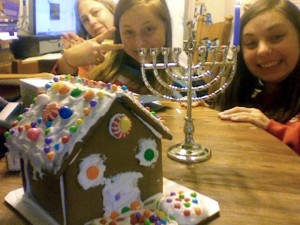In our house, we light the traditional Hanukkah candles, as we did last night, lighting the first candle and singing the blessings of the first night of Hanukkah. And we give gifts for the kids each night; not expensive presents like they’re likely to get from their grandparents on Christmas, but small, fun gifts to enjoy for the evening.
Last night, they got a gingerbread house, which they promptly decorated and then devoured. Yum.
But Hanukkah and Christmas have a deeper connection than just gift-giving and sweets. And the fact that they both begin on the 25th of the month— Hanukkah begins on the 25th of Kislev, and Christmas falls on the 25th of December.
The story of Hanukkah dates from about 150 years before Christ, during the days of the Roman Republic, when Antiochus IV ruled Syria. He decided to unify his subjects—as some rulers still do today—by stamping out all religious freedom. He had a grand vision, a monolithic society, made up of a single religion and culture, in which there was no division or dissension, absolute peace. No wonder he called himself Theos Epiphanes, “the manifest god.”
(Some of his contemporaries called him by the more accurate title, Epimanes, “madman,” but only behind his back and under their breath.)
Long story short: Antiochus decided to stamp out Judaism. He made Jewish worship illegal. He burned the Torah scrolls. The penalty for eating kosher or resting on the Sabbath, death. (Not sure how he even imagined to enforce that one fairly.)
His men traveled from town to town, village to village, forcing the Jews to worship pagan gods they did not believe in. In one story, they ordered Rabbi Eliezer, a respected elder 90 years old, to eat pork so that others would see and think it was alright under the circumstances. When he refused, they suggested that he merely pick it up and pretend to eat it. After all, he wouldn’t actually be breaking the Torah if he only pretended. And when he refused to do even that, they executed him.
In the midst of this oppression, an old priest named Matthew began an organized rebellion, to preserve his faith. These rebels were called “Maccabees,” which when spelled in Hebrew is an acronym for the phrase “Who is like you among the gods, O Lord?” (
That’s why the holiday that falls on the 25th of Kislev is called Hanukkah, which means “dedication.”
They lit the menorah, which burns in the Temple. But they had enough holy oil only to last for a single day. All the rest had been polluted when Antiochus’s men had ransacked the Temple. And as you’ve no doubt heard, somehow, the oil lasted for eight days, until more holy oil could be made available. This may seem a somewhat anticlimactic footnote to a dramatic story. But Jewish tradition is rich in symbolism. They marked these eight days as a symbol of the struggle that they had come through (and which they were still in).
So what does this have to do with Christmas?
The Maccabees and other Jews of that time struggled to preserve their religion and culture from a mad tyrant intent on destroying it. If Antiochus had succeeded in stamping out Judaism, Jesus Christ never would have been born, because there would been no Jewish culture for him to be born into 150 years later.
-TimK
